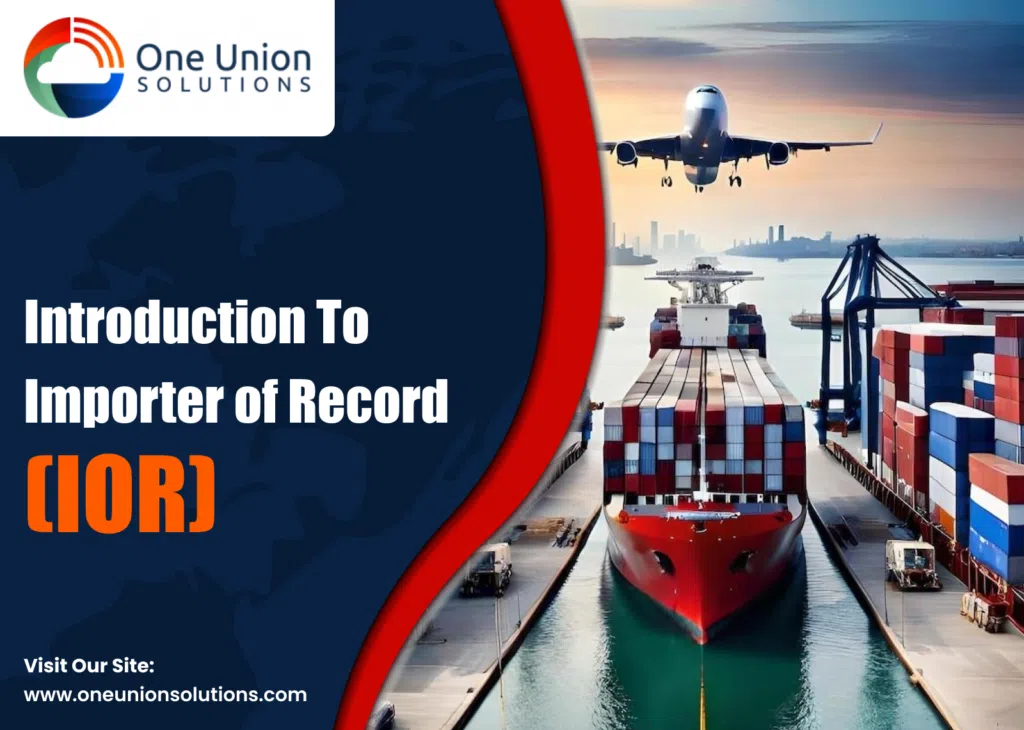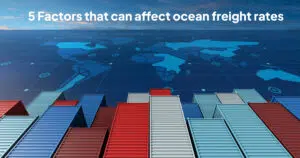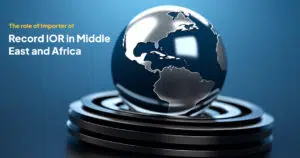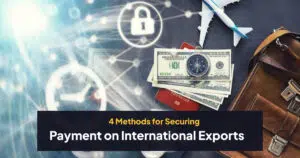Interpretation of Importer of Record (IOR) essentials
The Importer of record is a very important concept in international trade and customs regulation. The individual, who imports the products, is called the Importer of Record. The main reason why this term is important is that it identifies the individual or legal entity that bears the responsibility for imported items including duties, taxes, and compliance matters.
A party with the title “Importer of Record” takes on all legal obligations about importation. Such as compliance with requirements, payment of duties and taxes, and adherence to any other relevant legislation. In respect to these goods, the Importer of Record must have proper records. Some documents that may be kept are invoices, bills of lading, certificates of conformity as well as any other related papers required by customs officers.
For businesses involved in global trade, it assists them in navigating through legal requirements that govern their respective countries so they can ship products smoothly across borders. It’s necessary for enterprises trading internationally to be aware of each country’s specific conditions lest they face legal and monetary consequences.
Elucidating the Importer-on-Record
The IOR is a vital position in global business, especially regarding customs and import regulations. It refers to the entity or person responsible for ensuring that imported merchandise complies with the destination country’s rules and laws. It is important because this role enables smooth and legal entry of products into the country.
One of the main responsibilities of the IOR is assuming legal responsibility for imported goods, including carrying out various customs clearance obligations. IOR has many key aspects and responsibilities. This means that they have to adhere to tariff classification, valuation rules as well as other import requirements.
Import Regulation involves the submission of complete and accurate documentation to customs authorities which may include invoices, packing lists, and certificates of origin among other necessary documents that will demonstrate the value of imported products. They play an important role in ensuring that importing goods legally and compliantly into a country occurs without any problems. There are consequences such as customs delays or fines if importers do not perform these duties. Hence importers should be aware of destination countries’ customs regulations and abide by them.
Adaptation of History of IOR
It is quite interesting to know that it is a historical and global trade perspective. The process has gone through different stages with each stage having its own important events. It first began as the fundamental trade practices of ancient civilizations and it represents the early stage of development in the field of trading. Medieval market routes are one such, which mark remarkable milestones in history, thereby influencing the role played by IOR.
The age of exploration brought the greatest expansion in history. New trade routes came up and new territories were discovered; it was therefore a revealing moment for economics. Its evolution has responded to the challenges encountered by a global market in its growing complexity. The Industrial Revolution set benchmarks for import/export regulation and later on, industrialization became prominent in shaping importer of record duties globally. Throughout the 20th century, globalization solidified IOR into modern international business practice.
It’s evidence that trade itself is dynamic. From early civilization to today’s complex global commerce, IOR has developed with important steps in market history to adapt itself to remain compliant and efficient while moving goods across.
Disentangling Importer of Record
Knowing Importer of Record (IOR)
The IOR is a person or entity tasked with the responsibility of compliance with all legislation and regulations in an import destination for imported products. This work includes certain duties and obligations such as customs operation, payment of taxes and duties, and adherence to related documentation.
It is a person or body that appears on customs declaration papers and clearance documentation as an official importer. This might vary from one country to another but it may generally be the winner, the consignee, or an authorized customs broker.
Businesses in international markets are aware of this, which is why they have to play a crucial part in ensuring smooth customs processes and compliance with local laws. The complexity involved in importing shows the need for expertise or the use of professionals engaged in customs and logistics who can navigate through these processes successfully.
Core Responsibilities of an IOR
The essential role of the Importer of Record (IOR) must be emphasized more in the complex global market environment. This crucial position entails a multitude of responsibilities, all aimed at ensuring smooth and compliant trading across borders. From ensuring adherence to customs regulations and tax obligations to meeting regulatory requirements, the IOR is at the forefront of ensuring a seamless import process.
This involves meticulous attention to detail when it comes to preparing and verifying essential documentation such as invoices, packing lists, and certificates of origin. The IOR also takes on the critical task of accurately calculating, reporting, and paying any applicable import duties, taxes, and fees to customs authorities. Additionally, the IOR must stay up-to-date and compliant with Value Added Tax (VAT) requirements and be responsible for paying any relevant taxes on imported goods. To carry out these duties effectively, the IOR must stay informed about and adhere to the destination country’s constantly evolving import regulations and trade policies.
Lawful Impact of IORs
Importing goods carries significant legal responsibilities and requires strict adherence to both national and international laws. As an Importer of Record (IOR), one must closely observe compliance requirements, as importation is subject to a multitude of regulations. In this crucial role, IORs ensure that goods are imported with full compliance, contributing to a fair and transparent global trade system. Compliance with customs laws and regulations is paramount, encompassing accurate and thorough declaration of goods, correct classification, and valuation, plus any necessary licensing or permits. Additionally, IORs must uphold national and global trade laws, adhering to trade sanctions, embargoes, and restrictions on specific goods.
Significance of IOR in the Global Market
Exploring the Global Market: The Vital Significance of IOR
The IOR plays a vital role in ensuring that imported goods fully comply with the legal and regulatory standards of their destination country. From customs regulations and import restrictions to product standards, the IOR takes on the responsibility of ensuring complete adherence. Fulfilling these requirements is of utmost importance as it helps prevent any legal complications, potential penalties, and lengthy delays in the customs clearance process. By taking on the legal liability for imported goods, the IOR effectively mitigates risks associated with customs compliance, duty payment, and any other regulatory issues.
By leveraging the extensive knowledge of the IOR, businesses can confidently maneuver through the convoluted web of global trade regulations, minimizing the chances of mistakes and optimizing risk management. Acting as the linchpin of international commerce, the Importer of Record is responsible for guaranteeing adherence to legal requirements, facilitating smooth customs clearance, handling financial obligations, mitigating risks, offering valuable local expertise, and streamlining the overall efficiency of cross-border supply chains. In today’s ever-expanding global marketplace, the IOR’s role is increasingly vital in successfully navigating the intricate nuances of international trade.
Effortless Transnational Commerce
Cross-border transactions are critical for the flourishing of global trade. To ensure the hassle-free importing of goods, the role of Importers of Record (IORs) is paramount. These professionals aid in various aspects such as international shipping, trade facilitation, and customs procedures. Let’s delve deeper into how IORs enhance the efficiency of these vital processes by ensuring compliance with import regulations, including proper documentation and customs declarations. This, in turn, makes the import process smoother and more streamlined.
“With their extensive knowledge of local laws and regulations, IORs play a crucial role in facilitating smooth and hassle-free import procedures, mitigating the potential for delays and ensuring swift customs clearance. These experts expertly manage and coordinate all aspects of international shipping, collaborating with carriers, freight forwarders, and other partners to guarantee prompt and secure transportation of goods. Their expertise in shipping regulations and documentation enables them to streamline and optimize shipping processes, reducing the chances of interruptions during transit. In essence, IORs simplify cross-border transactions by adeptly handling the complexities involved, ultimately promoting a more efficient and streamlined flow of goods.” As key players in managing responsibilities such as duties, taxes, and compliance, IORs play a crucial role in creating a welcoming business atmosphere and fostering seamless trade connections between nations. With a deep understanding of customs protocols, IORs ensure that all necessary paperwork is precise and submitted punctually. By efficiently handling the customs clearance process, they help minimize hold-ups at borders, allowing for a quicker movement of goods and alleviating the bureaucratic load on companies.
Mitigating Risks and Challenges
IORs play a vital role in risk management within the global business landscape, utilizing various strategies to support businesses. Their pivotal position enables them to guide companies through intricate international trade environments, ensuring adherence to regulations and minimizing risks. With a steadfast focus on establishing robust risk management frameworks, these intermediaries effectively safeguard businesses engaged in global trade, taking on the responsibility of compliance, legal risk mitigation, and navigating complex trade laws. The world of global trade is fraught with obstacles, as countries impose trade barriers and tariffs. In the face of these challenges, Intermediary Organization Representatives (IORs) are essential in navigating these hurdles. By possessing a deep understanding of tariff structures and trade regulations, IORs can strategically manage these obstacles.
Each country has its own unique and complex customs procedures, documentation requirements, and compliance standards. However, IORs offer a simplified solution by ensuring that businesses comply with local customs regulations, avoiding any potential delays or penalties along the way. International Operations Representatives (IORs) have an extensive and comprehensive understanding of domestic markets, including regulations, cultural distinctions, and business methods. This proficiency allows companies to effectively navigate obstacles and adjust to unique market circumstances. Overreliance on a sole supplier or a small group of suppliers heightens the likelihood of disruptions. Through their services, IORs assist in evaluating and broadening the supplier pool to strengthen supply chain durability.
Overview of IOR Services
Comprehensive IOR Services: A Closer Look
It appears that your mention of “IOR Services” may ring a bell. Yet, based on my most recent update in January 2022, I do not possess any definite details regarding a company or service bearing that precise title. It is plausible that there have been advancements or the emergence of new companies since then. If “IOR Services” is a well-known entity that has gained prominence in the year 2022 or after, I highly suggest perusing their official website, recent news coverage, or industry reports in order to obtain the most precise and up-to-date information.
These sources may reveal valuable insights into the extensive range of services they offer, their core values and objectives, as well as any recent accomplishments or collaborations. Alternatively, if “IOR Services” pertains to a particular industry or field, please provide further context or specify the industry so that I can provide more relevant and targeted information. “IOR” can have multiple meanings, including but not limited to Input/Output Ratio in the realm of computing, Index of Refraction in the realm of optics, or Inward and Outward Remittance within the financial sector.
Documentation and Compliance
When it comes to IOR services, there is no denying the intricacy of navigating international trade regulations, import paperwork, and compliance protocols. The significance of precise documentation and regulatory adherence in these services simply cannot be emphasized enough. After all, they are what facilitate the seamless movement of goods between borders while upholding legal obligations. To establish a transparent framework, it is imperative to clearly outline the responsibilities and liabilities of the Importer of Record through a formal agreement.
When it comes to importation, empowering the IOR with legal authority is typically accomplished utilizing a Power of Attorney. This crucial document enables the IOR to effectively handle all customs clearance and compliance affairs. It is imperative that precise details of the transaction, such as the goods’ description and value, are provided for customs clearance and valuation. Additionally, information on packaging, weight, and dimensions plays a crucial role in streamlining customs processing and logistics. These documents serve as concrete evidence of shipment and ownership, easing the process of releasing the goods upon arrival.
Logistics and Customs Clearance
IOR services are integral to the smooth operation and adherence to regulations in the logistics and customs clearance processes of importing goods across borders. These services handle the preparation and submission of crucial customs paperwork, such as accurate customs declarations, commercial invoices, packing lists, and other necessary documentation. With their deep knowledge and expertise in customs procedures, IORs collaborate closely with customs authorities to establish the accurate valuation of goods for customs purposes.
This intricate task requires careful consideration of key factors such as transaction value, transfer pricing, and the customs valuation methods. As seasoned professionals, IORs also play a critical role in determining the appropriate duties, taxes, and fees to be assessed based on the importing country’s customs tariff. They take great care to ensure that all necessary payments are made promptly, thus expediting the release of goods.
Importance for Businesses
Empowering Businesses through Importer of Record Expertise
By harnessing specialized expertise and services, Importers of Record (IORs) are essential to empowering businesses in their international trade endeavors. They streamline the intricacies involved in cross-border transactions, freeing up businesses to concentrate on their core operations. With a deep understanding of import regulations and compliance standards, IORs are constantly updated on the constantly changing international trade laws, ensuring businesses remain in line with legal requirements and avoiding costly penalties and disruptions.
When it comes to expanding internationally, businesses are no strangers to encountering obstacles in the form of varying customs and trade regulations. This is where Importer of Record (IOR) services prove to be invaluable, as they possess the necessary expertise to navigate these complexities. By enlisting the help of professional IORs, companies can confidently and efficiently break into new markets. By empowering themselves with their knowledge and assistance, businesses can overcome the unique challenges of global trade, broaden their global presence, and streamline their supply chain with compliance.
Enhancing Market Expansion
Illustrating how businesses can leverage IOR services to enter new markets confidently
Launching into new markets necessitates meticulous preparation and examination of multiple elements. Utilizing the expertise of Importer of Record (IOR) services can substantially amplify progress in expanding into markets, empowering businesses to skillfully maneuver through international intricacies. IORs collaborate closely with businesses to craft personalized strategies for market entry. This encompasses evaluating market dynamics, comprehending consumer tendencies, and aligning import procedures with the particular requirements of the desired market. Seasoned IORs typically possess a robust network of regional associates, such as customs agents, delivery service providers, and legal consultants.
By taking advantage of these connections, companies can tap into local knowledge and skills, making it easier for them to enter new markets smoothly. This collaboration with IOR services empowers businesses by offering expertise, mitigating risks, and ensuring adherence to regulations, giving them the confidence to expand into foreign markets. Working alongside seasoned IOR partners, organizations can navigate the intricacies of international trade more effortlessly, positioning themselves for prosperous overseas growth.
Focus on Core Competencies
Emphasizing how outsourcing IOR responsibilities allows companies to concentrate on their core strengths
By outsourcing the responsibility of Importer of Record (IOR), companies can shift their focus toward their key strengths and strategic goals, ultimately achieving efficiency in their operations and fostering business growth. This transfer of IOR duties to specialized service providers allows companies to better allocate resources and prioritize their financial and human capital. As a result, they can concentrate on tasks that directly align with their core competencies, such as developing new products, marketing, and providing exceptional customer service. These specialized IOR service providers bring a wealth of knowledge and experience to navigate the intricacies of international trade, ensuring a seamless and efficient process. By outsourcing their Importer of Record (IOR) responsibilities, businesses can optimize their operations, lessen administrative responsibilities, and improve their supply chain efficiency without taking away from their main focuses. This allows companies to fully concentrate on their strengths and strategic goals, leading to improved operational effectiveness, decreased risks, and a more adaptable and competitive business landscape, ultimately resulting in sustained growth and achievement.
Conclusion
Navigating the Global Trade Landscape with Importer of Record Expertise
Successfully navigating the global trade landscape requires a thorough grasp of international regulations, customs procedures, and compliance standards. Having expertise as an Importer of Record (IOR) becomes an invaluable asset on this journey, providing businesses with the necessary knowledge and assistance to navigate the complexities of cross-border trade. By utilizing IOR services, companies gain access to a wealth of regulatory expertise, ensuring compliance with a diverse range of global trade regulations. IORs simplify the customs clearance process, handle documentation, and facilitate the seamless transportation of goods across borders, minimizing the chances of delays and improving overall operational efficiency. Not just limited to logistics, IORs play a crucial role as strategic partners.
They offer valuable knowledge on cultural intricacies, market dynamics, and risk mitigation tactics. With their vast global connections and knowledge of diverse markets, businesses are able to tailor their strategies to cater to local preferences, paving the way for prosperous market entry and growth. In today’s ever-changing global trade landscape, the role of Importer of Record expertise takes center stage, empowering businesses to fearlessly broaden their scope, enter uncharted markets, and flourish in the dynamic and interconnected world market. As companies maneuver through the complexities and possibilities of global trade, collaboration with seasoned IORs becomes a critical aspect of their triumph.
Future Trends in IOR Offering insights into the evolving landscape of Importer of Record services
Although it can be difficult to make definite predictions, several signs point towards the potential growth and development of Importer of Record (IOR) services and the trade industry as a whole. The future of IOR services is expected to involve a greater use of technology, such as automation, artificial intelligence, and data analysis. By leveraging these advanced tools, IOR services have the potential to simplify customs clearance procedures, strengthen compliance monitoring, and optimize import and export processes. As international trade regulations become more complex, IOR services may adapt to offer more comprehensive compliance solutions. Businesses can gain a competitive edge by implementing features like monitoring compliance in real time, utilizing predictive analytics, and leveraging proactive risk management tools. These innovations can assist in keeping businesses one step ahead of regulatory modifications.
FAQs
What is IOR and why it’s essential in an international market?
When importing products into a nation, the person or legal organization in charge of making sure that import laws are followed, fees and taxes are paid, and import rules are followed is known as the Importer of Record (IOR). It’s crucial because it establishes who is legally liable for imported products, makes customs processing easier, and ensures local rules and regulations are followed.
What changes have you seen historically in the Importer of Record (IOR) role?
Since traditional market patterns gave way to the current global business environment, the role of an Importer of Record has changed. In response to the demands of a dynamic global market, historical turning points like the Industrial Revolution and medieval trade routes have molded the roles and responsibilities of IORs.
What are the legal ramifications of importing products through an Importer of Record (IOR)?
An IOR must carefully monitor compliance requirements, such as accurate goods declaration, proper classification and valuation, and adherence to trade sanctions and embargoes, as importing goods entails significant legal responsibilities. By guaranteeing that imported products adhere to legal and regulatory requirements, IORs support an equitable and transparent international commerce system.
Which Importer of Record (IOR) services will be in demand in the future?
To streamline import and export operations, improve compliance monitoring, and streamline customs clearing procedures, future advancements in IOR services may entail a larger use of technology, such as automation, artificial intelligence, and data analysis. As international trade rules change, IOR services may also be modified to provide more complete compliance solutions.







